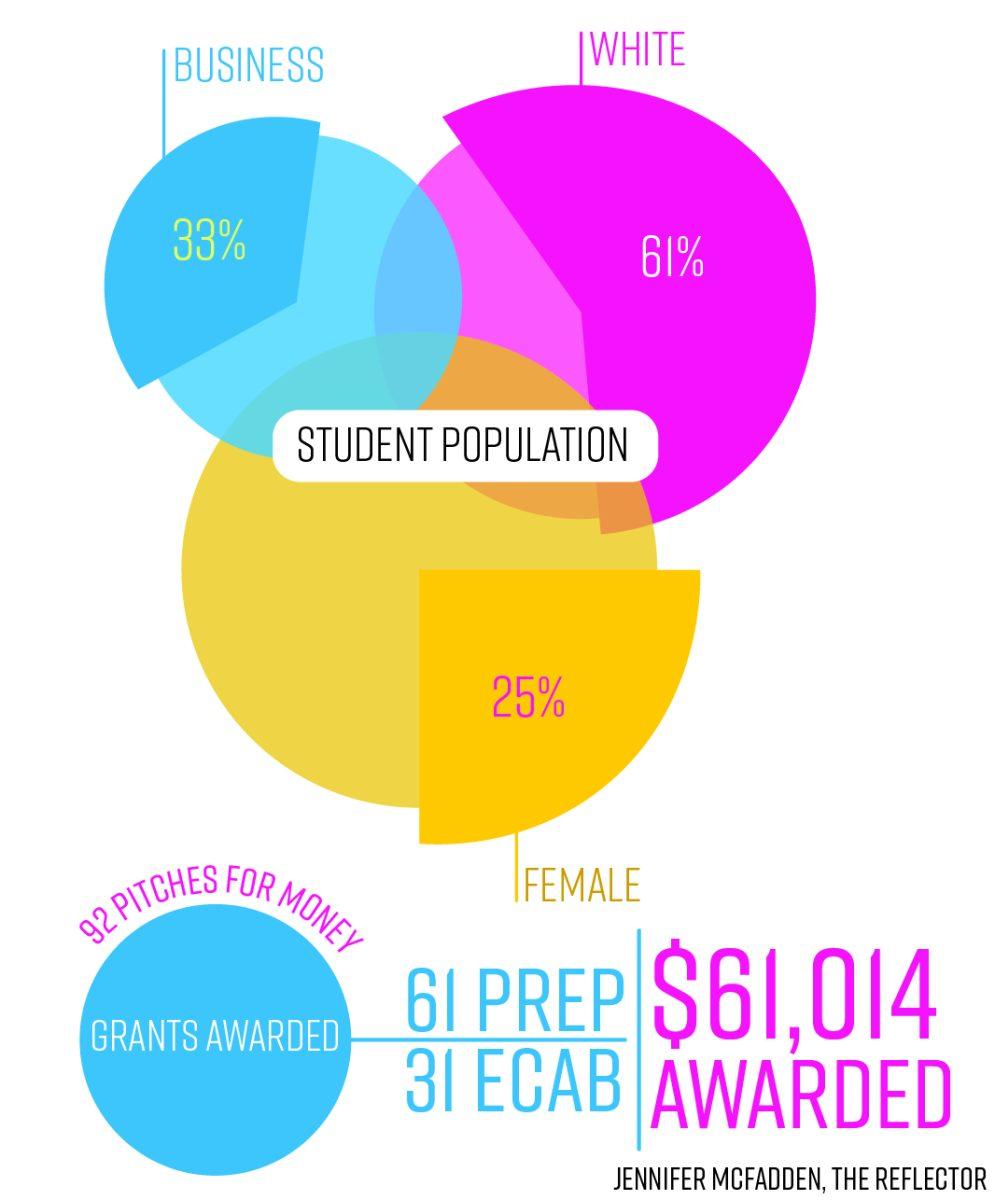At the monthly Entrepreneurship Center Advisory Board (ECAB) meeting Sept. 29, four out of the five student and faculty business pitches received funding.
ECAB is a step in the VentureCatalyst Program where individuals present their startups to a board of about a dozen professors and CEOs. The board can grant the entrepreneurs up to $2,000.
Similar to the show “Shark Tank,” the event provides an option for Mississippi State University students and staff to get their business ideas off the ground.
The businesses that received funding at last month’s meeting include Carpo, a long distance ridesharing service; Vado, a study abroad travel service provider; Body Sensor Network, which combines sports equipment with sensors to make sure exercises are executed properly; and a UAV-based reception tester, which tests wireless signals for strength and distance capabilities.
Carpo was created by Mahdi Boucetta, a senior industrial engineer from Morocco. Through the service, MSU students will have access to online services connecting drivers and riders who are going to the same destination.
Boucetta said the service is especially helpful for foreign students traveling to large international airports like Atlanta’s Hartsfield-Jackson to cities like Starkville.
“Starkville is a nice, small town, but unfortunately it is hard and costs a lot to get here,” Boucetta said. “Airfares are very expensive, [and there are] no trains and no buses. While sharing a ride (with Carpo), the gas and toll money will be split among the people in the car.”
Boucetta said the company’s website is completed, but “small touches” still need to be added. He said he thinks it will be operational in about three months.
In the second stage of the VentureCatalyst Program, Boucetta received a total of $2,500. He was invited to pitch his service in Jackson at the Mississippi New Venture Challenge for $3,000.
Boucetta said the E-Center helped him tremendously with his startup.
“The Center for Entrepreneurship helped me to define my goals and to be very specific in what I want to do,” he said. “[E-Center Director] Eric [Hill] has been a great help for me. I went to him with my idea that was not well developed and not focused, and he helped me to make it more realistic and more adequate.”
Faculty, as well as students, can bring their ideas to the E-Center. Vado was created by Charles Freeman, a professor in the School of Human Sciences.
Freeman said one of the company’s goals is to lower the overall cost of traveling abroad by using technology and direct country service connections. Vado received $2,000 from ECAB last month to help the full-service study tour cover start-up fees.
He said the company is working with three contracts from outside universities for an “alpha launch” in summer 2018. He said the service will be in full-swing in a year.
Freeman said he encourages anyone with a business or product idea to visit the E-Center in 101 McCool.
“The E-Center is one of the single best resources for any student or faculty looking to start their own business,” Freeman said. “Through their guidance, we have been able to detail our business model and develop a strategic plan for the next 18 months.”
About the VentureCatalyst Program and E-Center
The VentureCatalyst Program is a five-stage program that helps take a business idea and turn it into a company.
The first step is to walk through the doors of the E-Center, explain your idea to someone and develop a team.
“Any student who might be reading this, the first step is just to walk through that door,” said Jeffrey Rupp, the E-Center’s director of outreach. “We take walk-ins and sometimes that’s the hardest part is just getting them to come in the door. As soon as they come in, we will walk them through the steps and get them signed up.”
The second step is to pitch in front of student peers for $500. Rupp said this helps determine whether or not there is a market for your business.
“Some of our students say that going in front of the students is actually harder than coming in front of the board,” Rupp said. “The students are really, really tough on them.”
Next, you go before ECAB and pitch an idea for backing of up to $2,000. Rupp said the money ECAB gives is a mixture of endowments and grants.
The third step is to launch your business and gain more funding by presenting to the Bulldog Angel Network, for up to $5,000.
After these steps, the goal is to make your business self-sustaining. In this phase, there is potential to gain more than $25,000.
“We take in about 100 teams a year and our goal is to have four of them funded by the end of the year,” said E-Center Director Eric Hill.
According to Rupp, while a lot of business startups fail, learning from the experience is the most important thing.
“We don’t consider failure to be failure because you learn from that,” Rupp said. “Most people who start a business are going to start several. It’s all part of the process.”
If you are interested in entrepreneurship, there are three different groups in the E-Center—the Entrepreneurship Club, The Factory (MSU’s Maker Space) and Dev Net, a programming club.
The next ECAB meeting is at 12 p.m. Oct. 27 in McCool 339.




















































































